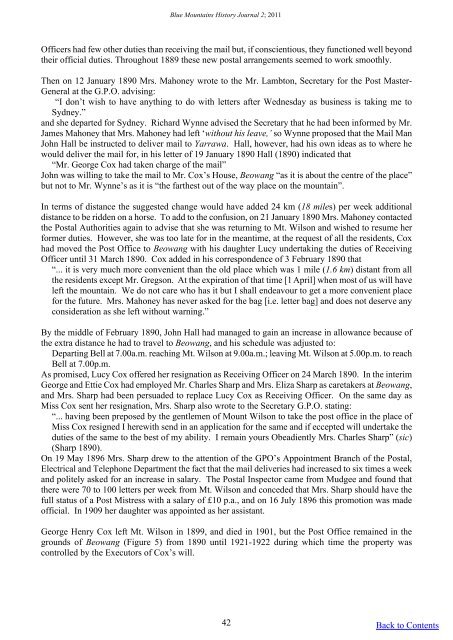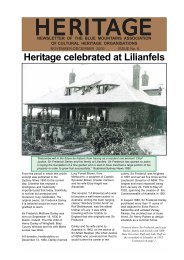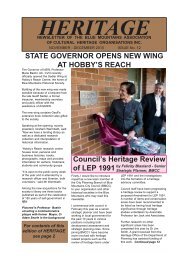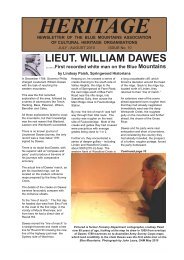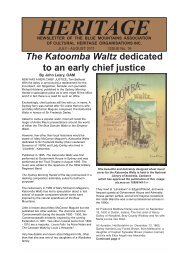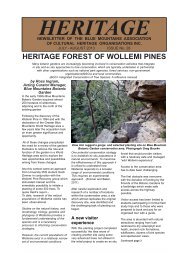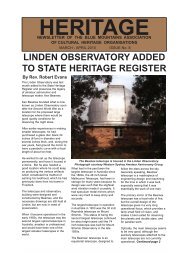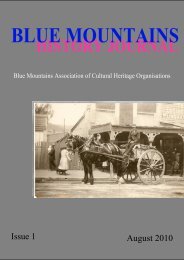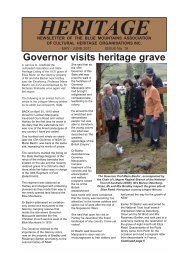Blue Mountains History Journal Issue 2
Blue Mountains History Journal Issue 2
Blue Mountains History Journal Issue 2
Create successful ePaper yourself
Turn your PDF publications into a flip-book with our unique Google optimized e-Paper software.
<strong>Blue</strong> <strong>Mountains</strong> <strong>History</strong> <strong>Journal</strong> 2; 2011<br />
Officers had few other duties than receiving the mail but, if conscientious, they functioned well beyond<br />
their official duties. Throughout 1889 these new postal arrangements seemed to work smoothly.<br />
Then on 12 January 1890 Mrs. Mahoney wrote to the Mr. Lambton, Secretary for the Post Master-<br />
General at the G.P.O. advising:<br />
“I don’t wish to have anything to do with letters after Wednesday as business is taking me to<br />
Sydney.”<br />
and she departed for Sydney. Richard Wynne advised the Secretary that he had been informed by Mr.<br />
James Mahoney that Mrs. Mahoney had left ‘without his leave,’ so Wynne proposed that the Mail Man<br />
John Hall be instructed to deliver mail to Yarrawa. Hall, however, had his own ideas as to where he<br />
would deliver the mail for, in his letter of 19 January 1890 Hall (1890) indicated that<br />
“Mr. George Cox had taken charge of the mail”<br />
John was willing to take the mail to Mr. Cox’s House, Beowang “as it is about the centre of the place”<br />
but not to Mr. Wynne’s as it is “the farthest out of the way place on the mountain”.<br />
In terms of distance the suggested change would have added 24 km (18 miles) per week additional<br />
distance to be ridden on a horse. To add to the confusion, on 21 January 1890 Mrs. Mahoney contacted<br />
the Postal Authorities again to advise that she was returning to Mt. Wilson and wished to resume her<br />
former duties. However, she was too late for in the meantime, at the request of all the residents, Cox<br />
had moved the Post Office to Beowang with his daughter Lucy undertaking the duties of Receiving<br />
Officer until 31 March 1890. Cox added in his correspondence of 3 February 1890 that<br />
“... it is very much more convenient than the old place which was 1 mile (1.6 km) distant from all<br />
the residents except Mr. Gregson. At the expiration of that time [1 April] when most of us will have<br />
left the mountain. We do not care who has it but I shall endeavour to get a more convenient place<br />
for the future. Mrs. Mahoney has never asked for the bag [i.e. letter bag] and does not deserve any<br />
consideration as she left without warning.”<br />
By the middle of February 1890, John Hall had managed to gain an increase in allowance because of<br />
the extra distance he had to travel to Beowang, and his schedule was adjusted to:<br />
Departing Bell at 7.00a.m. reaching Mt. Wilson at 9.00a.m.; leaving Mt. Wilson at 5.00p.m. to reach<br />
Bell at 7.00p.m.<br />
As promised, Lucy Cox offered her resignation as Receiving Officer on 24 March 1890. In the interim<br />
George and Ettie Cox had employed Mr. Charles Sharp and Mrs. Eliza Sharp as caretakers at Beowang,<br />
and Mrs. Sharp had been persuaded to replace Lucy Cox as Receiving Officer. On the same day as<br />
Miss Cox sent her resignation, Mrs. Sharp also wrote to the Secretary G.P.O. stating:<br />
“... having been preposed by the gentlemen of Mount Wilson to take the post office in the place of<br />
Miss Cox resigned I herewith send in an application for the same and if eccepted will undertake the<br />
duties of the same to the best of my ability. I remain yours Obeadiently Mrs. Charles Sharp” (sic)<br />
(Sharp 1890).<br />
On 19 May 1896 Mrs. Sharp drew to the attention of the GPO’s Appointment Branch of the Postal,<br />
Electrical and Telephone Department the fact that the mail deliveries had increased to six times a week<br />
and politely asked for an increase in salary. The Postal Inspector came from Mudgee and found that<br />
there were 70 to 100 letters per week from Mt. Wilson and conceded that Mrs. Sharp should have the<br />
full status of a Post Mistress with a salary of £10 p.a., and on 16 July 1896 this promotion was made<br />
official. In 1909 her daughter was appointed as her assistant.<br />
George Henry Cox left Mt. Wilson in 1899, and died in 1901, but the Post Office remained in the<br />
grounds of Beowang (Figure 5) from 1890 until 1921-1922 during which time the property was<br />
controlled by the Executors of Cox’s will.<br />
42 Back to Contents


